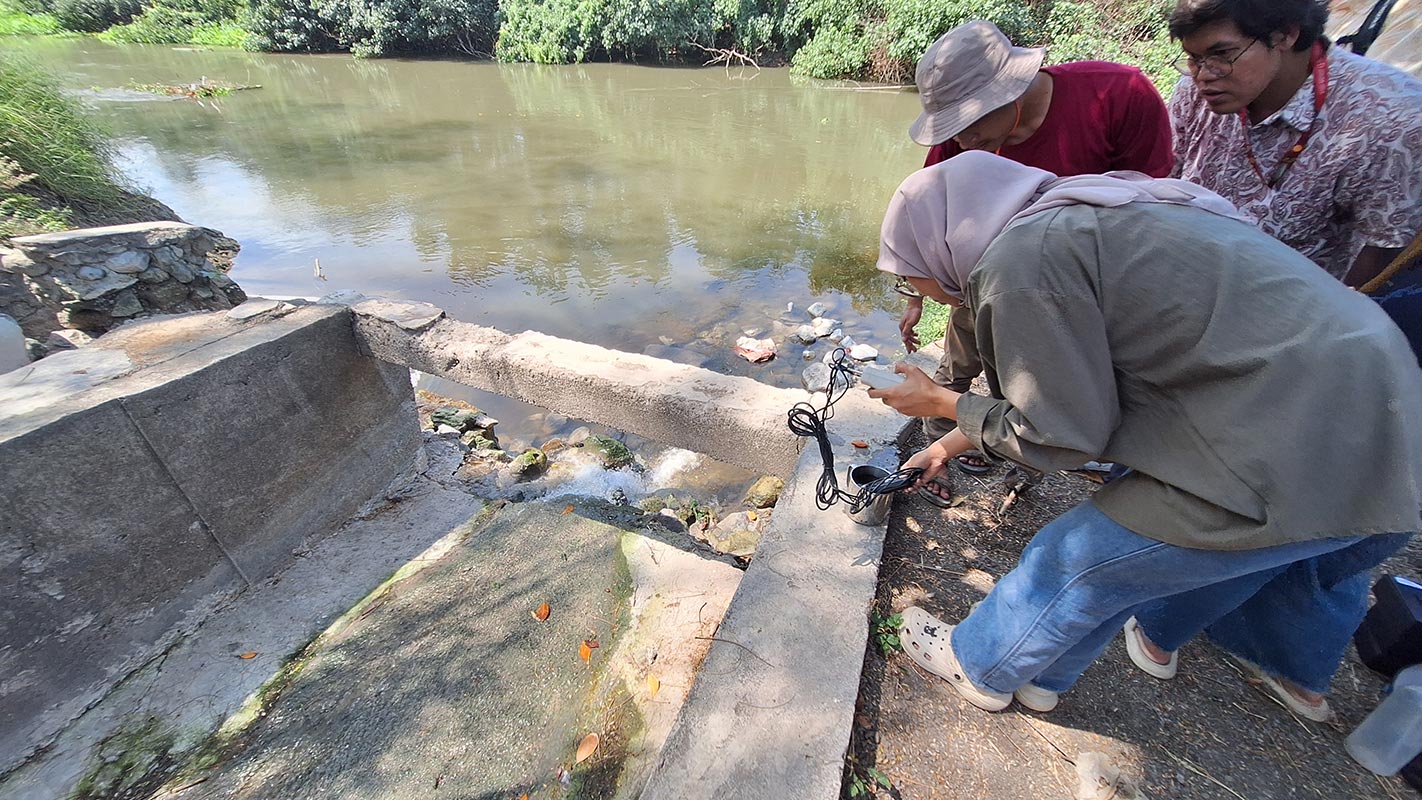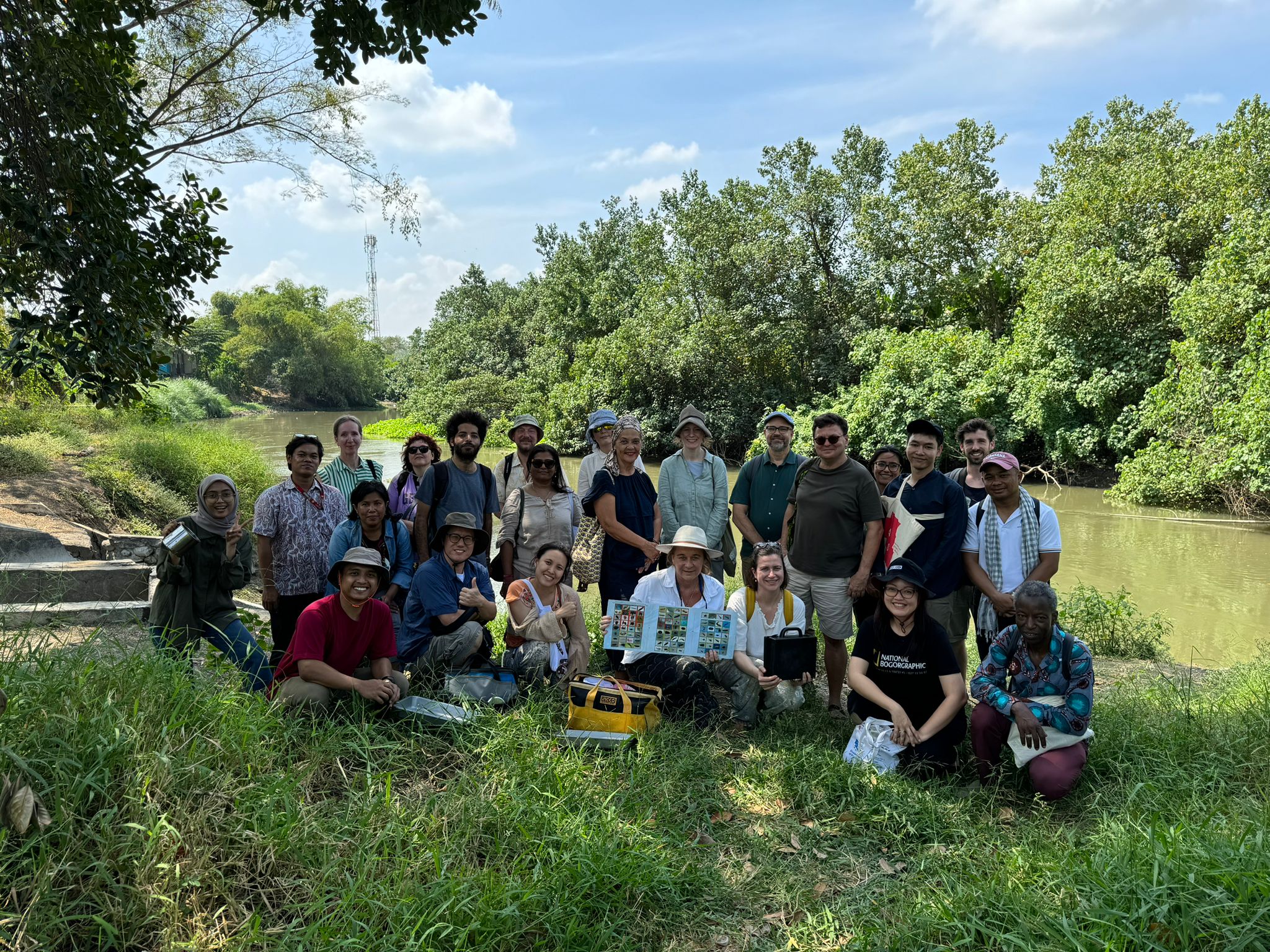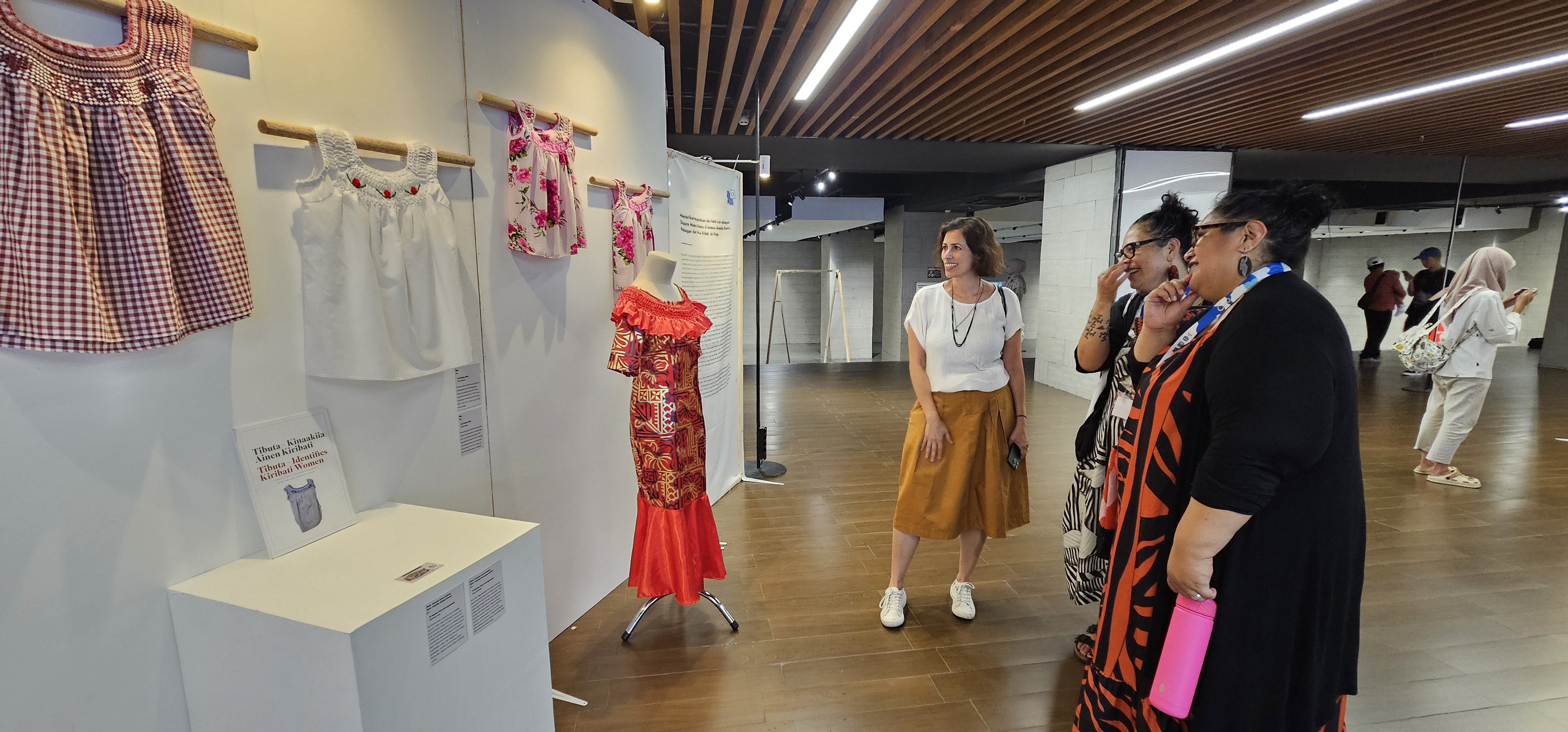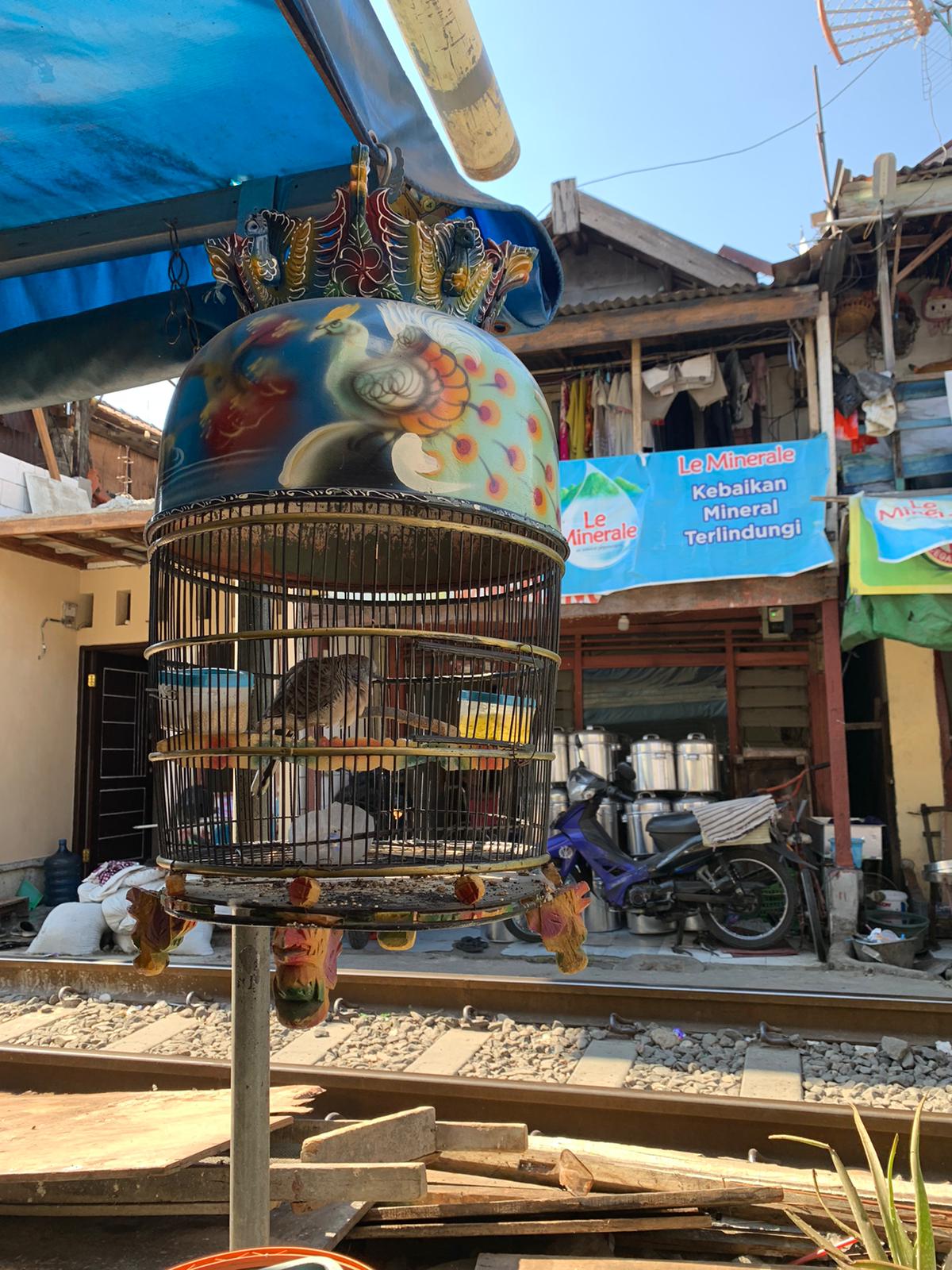Workshops and Film Screenings at ICAS 13
Documenting the City: Ethnographic Engagements Beyond the Fieldnote
The workshop took place on a beautiful Sunday, 28th July, 2024, in the Kampung Plampitan. As workshop coordinator, I had the opportunity to visit the kampung the day before, which helped in setting a realistic program for the next day. The live workshop format helped us get a firsthand experience of the nuances of observation and documentation involved in fieldwork using alternative methods. After a brief introduction (by the coordinator), participants were taken on a walk around the Kampung, after which they were invited to share their findings. The workshop was attended by over 20 participants who thoroughly enjoyed the experience.
Anasua Chatterjee, RKSMVV, West Bengal State University
Public Intervention – Workshop of Inflatable Sculpture in Public Space
Throughout the afternoon, participants from different parts of the world gathered to create an inflatable sculpture as a creative way to support a protest or cause. Not by chance, some came from countries like Myanmar, Hong Kong, Indonesia, and India, where protesting has become a sensitive issue in recent years. After the initial session, where we shared experiences, references, and the use of inflatables in demonstrations, we decided to build a giant dynamite sculpture with the words "Masih lembur?" (“Still overworking?”), addressing the long and precarious work hours faced by many Indonesian workers and scholars. It was displayed on campus and in the public square Balai Pemuda for an entire week.
Frederico Ravioli, ARCO Cooperative School
Gabriel Ussami, University of São Paolo, Brazil

Fig. 2: Interactive workshop along Surabaya's waterways hosted by the River Cities Network (RCN).
Public History in Indonesia
Accompanied by the rhythmic sound of drums from across the water, I presented practical examples at Museum Pendidikan, illustrating how participatory public history can help co-create more inclusive historical narratives. Participants were encouraged to reflect on their own positionality and brainstorm project ideas, including crowdsourced exhibitions, oral histories in public spaces, and co-creating urban art. The workshop sought to inspire attendees to incorporate participatory methods into their work, fostering a more diverse and inclusive representation of Indonesia’s past within their respective contexts.
Joëlla van Donkersgoed, University of Luxembourg
Kampungs of Surabaya – A Singapore-Indonesia Collaborative Documentary Filmmaking Project
Singapore Polytechnic (SP) highly values its partnerships with both industry and universities. It was a pleasure to present the collaboration between SP's Media, Arts & Design School and Universitas Airlangga, Indonesia. Our session was met with an engaged and enthusiastic audience, and their positive, insightful feedback was incredibly encouraging. They recognised the significant effort invested in training students through real-world experiences and appreciated the pedagogical approach, which not only enhances students' technical filmmaking skills but also fosters their resilience and broader worldview.
Mary Chin, Singapore Polytechnic, Singapore
Titik Puji Rahayu, Universitas Airlangga, Indonesia
Fig. 3: Participants view the photo exhibition “Who Owns Durga?” at Balai Pemuda Timur.
Between History and Myth: Sea Legends in Hong Kong's waters from mermaids to pirates
Knowledge production in academia is not limited to written texts and papers. At ICAS 13, we presented our ongoing artistic research on inter-Asian diasporic Chinese migration histories as a lecture performance and exhibition, using the mediums of storytelling, contemporary dance, and video art. Under the Oceanic Crossroads theme, Surabaya was the perfect location for us to present our performance series! Appealing to the affective and the imaginative opens up new avenues for knowledge exchange, and we had a great time sharing our working method and philosophy with a very engaged audience. We look forward to seeing more artistic collaborations, where research meets embodied expressions, in future conference-festivals!
Evelyn Wan, Utrecht University, the Netherlands
Alysa Leung, Independent Artist, Hong Kong
Anson Sham, Independent Filmmaker, Honk Kong
Grounding Soils in Southeast Asia: A Workshop for Soil Scientists, Artists, Practitioners, Activists, and Interdisciplinary Researchers
The “Grounding Soils” workshop brought together over 20 early-career soil and interdisciplinary scholars, artists, and activists in the ICAS framework to share contexts, practices and knowledges on soils in Southeast and East Asia. We co-produced the workshop with our collaborators to respond to the following questions: 1) What is the potency of the cultural work that activists and artists carry out in creating new cultural forces to actualize ecological relations between people and their homes? 2) What forms of exploitation may arise as soil becomes a commodity, which manifests as existential threats by those connected to the most vulnerable? How does this tension erode knowledge of soil into the formation of land according to the logic of privatization and expropriation? The responses were grounded in multimodal activities.
Dimas D. Laksmana, Universitas Indonesia, Indonesia
Huiying Ng, Rachel Carson Center for Environment and Society, Ludwig-Maximillians University, Germany
Ismal Muntaha, Badan Kajian Pertanahan, Indonesia
Markus Wernli, Hong Kong Polytechnic University, Hong Kong
Joshua Ezekiel Sales, Food Today Food Tomorrow, Philippines

Fig. 4: Group photo of excursion and workshop hosted by the River Cities Network (RCN).
Nickel Unearthed – The Human and Climate Costs of Indonesia's Nickel Industry
Danishwara Nathaniel, Geneva Graduate Institute
Adlun Fiqri, Fakawele & SaveSagea, Indonesia
Anitha Silvia, C2O Library & Collabtive, Indonesia
Jiahui Zeng, Tsinghua University, China
A short film and photo-essay advocating for the communities impacted by nickel mining expansion in Halmahera were presented by Adlun Fiqri, an activist, photographer, and spokesperson for the SaveSagea movement. The discussion was moderated by student members of Amnesty UNAIR, with scholars working on the topic of extractive industries and environmental justice – Jiahui Zeng and Danishwara Nathaniel – as discussants. Adlun, hailing from Sagea in North Maluku – one of the villages deeply affected by the industrialization of Halmahera's coastlines – expressed his appreciation for the effort to include non-academics, civil society, and activists in an international academic forum, recognizing the importance of addressing urgent climate (in)justice issues, while amplifying the voices of those bearing the heaviest burden. Please check out our Instagram account for the highlights of our events: https://www.instagram.com/imageapproject
Urban Sketchwalk – Tracing the Spice Route in Surabaya
We began with the Sketchwalk on a vibrant Sunday morning (July 28th) as participants of ICAS 13 were arriving. With sketchbooks in hand and drawing tools tucked close, the group wandered through the city as it gently woke up to the bright sunlight. The sketchers captured scenes of the market awakening for its regulars, the graceful forms of old architecture, the city's landmarks, and the rhythms of daily life as its dwellers move through their day. The workshop is the result of a collaborative session between Urban Sketchers Surabaya (USK) and Fadriah Syuaib, an artist from Ternate, North Maluku, who both employed similar methods of knowing one’s urban environment through the act of sketching. From the discussions they have had, they both agreed that sketching as a practice can be a great educational tool for observation, noticing, and representation of a social world, particularly for young participants getting acquainted with visual arts at an earlier stage of their education.
Similarly, the urban heritage walk involved Surabaya heritage enthusiasts and communities named Oud Soerabaja Hunter (OSH). Participants were guided through the Surabaya Old Town area, where we also got the chance to enter some historic colonial buildings and learned firsthand, on-site what certain artifacts and symbols signify in their original state. Such practices form the basis of enlivening Urban Heritage Landscape, whereby communities can participate in making and learning about the historical dynamics of their own city and its development.
Please consult our Instagram (@imageapproject), where we use the platform to document, exhibit, and interact with the work of our interlocutors, including those from this programme.
Danishwara Nathaniel, Geneva Graduate Institute
Fadriah Syuaib, Ternate, Indonesia
Anitha Silvia, C2O Library & Collabtive, Indonesia
Fig. 5: Spices and artworks on display at ICAS 13.
Furnishing Cultural Heritage: Visual Storytelling with Pen and Ink
At the ICAS 13 Conference-Festival 2024 in Surabaya, Indonesia, participants engaged in an on-site workshop titled “Furnishing Cultural Heritage: Visual Storytelling with Pen and Ink” at Bungkul Park, a historic and urban activity hub. The session encouraged participants to photograph and sketch natural surroundings, slowing time in observation and reflection. Attendees practiced sketching while experiencing tension between the modernization and preservation of a cultural heritage site. Our activity blended social, cultural, and environmental themes, in an expanded interdisciplinary dialogue and artistic expression. The park, recognized for its protected green space, provided the perfect backdrop for this open creative exchange.
Thea Mercer, Independent Researcher, Ireland

Fig. 6: Participants viewing textiles from Kiribati, exhibited in the basement of Balai Pemuda.
Water Champions in River Revitalization: Catalysts for Crafting a Sustainable, Resilient Blueprint of Heritage Cities in Indonesia
Komunitas Lanskap Budaya (KALBU) and IDN Liveable Cities are thrilled to have hosted the Water Champions game not once, but twice! Our first session energized conference participants, including members of the River Cities Network, while the second ignited the creativity of students of Narotama University, Surabaya. Remarkably, the students showcased exceptional resourcefulness in tackling the game's challenges. This experience fills us with hope that these future young leaders will spearhead river revitalization efforts, uniting communities and stakeholders alike. Together, we can forge sustainable, resilient cities that honor and protect our vital water resources! Many thanks to the amazing ICAS 13 organizers.
Wiwi Tjiook, IDN Liveable Cities
Dani Myrwati Soedjalmo, KALBU (Indonesia Cultural Landscape Community), Indonesia
Yuni Prihayati, KALBU, Indonesia
Euis Puspita, KALBU, Indonesia
Arief Rahman, Institute Pertanian Bogor, Indonesia

Fig. 7: A view of Dupak Magersari, a kampung built adjacent to one of Surbaya's railways.